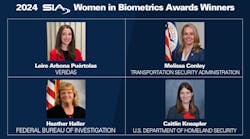Diverse skill sets and perspectives are paramount in the security industry. With their distinctive experiences and attributes, female athletes emerge as prime candidates for roles in this dynamic field. Their athletic backgrounds instill discipline, resilience, and strategic problem-solving, which are crucial for influential security professionals.
In my role as Chair for the Security Industry Association’s Women in Security Forum (WISF), we are articulating to the industry why female athletes are particularly suited for the security sector and how their inclusion can enhance industry standards and practices. We recently sat down with student-athletes and coaches from the University of Louisville to better understand these trends. This article will examine major takeaways from our research and recent discussions with college athletes pursuing this path.
The Drive of Female Athletes
At the heart of every accomplished athlete lies a profound drive for excellence. Through their dedication to rigorous training and high-pressure competition, female athletes exemplify an unyielding pursuit of goals and a desire for excellence. Their lives are a testament to balancing demanding schedules, including early practices, academic responsibilities, and social commitments, with a consistent focus on improvement and achievement.
For example, Merissah Russell and Phekran (PK) Kong are student-athletes at the University of Louisville. Russell’s involvement in basketball, academics, and internships showcases her ability to effectively juggle multiple high-stakes commitments via various competencies. The same is true of Kong. These attributes reflect the intrinsic drive that aligns seamlessly with the demands of the security field, where managing stress, adapting to fast-paced, dynamic scenarios, and maintaining an unwavering focus on multiple objectives simultaneously are essential qualities for success.
Core Strengths of Teamwork and Leadership
The security industry thrives on individuals who can balance roles as effective team members and decisive leaders. Female athletes excel in these areas, honing their skills through experiences requiring exceptional communication, trust, and team effort. Their common ability to navigate complex team dynamics, resolve conflicts, and lead by example mirrors the collaborative and leadership demands of security roles.
University of Louisville Women’s Basketball Coach, Stephanie Norman, emphasizes the importance of fostering a cohesive team environment. Her players’ adeptness at navigating interpersonal communication and leading under pressure prepares them for roles that demand collaborative effort and independent decision-making, which are critical for success in security professions.
Commitment and Loyalty
Female athletes often exemplify a profound sense of commitment and loyalty, which can extend beyond their sports careers into many professional realms. Their dedication to their sport, team, and personal development fosters deep loyalty that translates into their professional endeavors. This commitment is evident in the SIA WISF PropelHER initiative as Russell and Kong plan their futures with the same dedication they exhibit on the court, eager to apply their skills to new challenges in the security field.
In our discussion, Kong reflected on how athletes handle confrontation and adversity, adapting to challenges with resilience and a strategic mindset. This ability to overcome obstacles is mirrored in security, where professionals often face high-pressure situations where an initial solution proves insufficient.
Moreover, Russell’s reflection on her basketball career, where she had to overcome initial challenges and push herself beyond her limits, exemplifies the essential commitment and adaptability in security roles. These athletes' experiences prepare them for the complex and dynamic nature of the security field, making them ideal candidates for several critical roles.
Navigating Dynamic Situations
The dynamic nature of security work necessitates individuals who can swiftly adapt to changing circumstances and assimilate new information. Female athletes excel in this aspect. Their ability to adapt to varying game plans, opponents, and unexpected scenarios during competitions prepares them from an early age. Their proficiency in strategic adaptation and swift decision-making makes them well-suited for the unpredictable nature of security roles.
Kong noted the importance of flexibility in athletic success, showcasing how athletes transition seamlessly between diverse activities, from training sessions to academic responsibilities. This ability to adapt quickly to new information and changing environments is crucial for many security positions, where professionals must always be agile and responsive.
Inclusivity and Diverse Perspectives
Incorporating more female athletes into the security field goes beyond addressing gender disparities; it introduces fresh perspectives and experiences that help drive innovation. Their athletic backgrounds cultivate a unique outlook that enriches industry approaches and solutions. The presence of female athletes promotes an inclusive environment that values diverse strengths and viewpoints, which is necessary for a holistic and effective security strategy.
At the Women in Security Forum, we advocate for a bolder presence for women within the security industry and provide platforms for women to excel in security roles. Integrating female athletes into our workforce taps into a pool of highly qualified candidates and promotes a culture of inclusivity that benefits the entire industry. Their experiences in sports, often in male-dominated environments, position them as natural leaders and advocates for gender equity in the workplace.
Bridging the Gap
To fully leverage female athletes' potential, we must create pathways accommodating their unique schedules and commitments. Offering flexible internships, remote work opportunities, and robust mentorship programs can facilitate their transition from athletic careers to security roles. Meeting them where they are and providing the support they need ensures a smooth transition into the security field.
It is also the industry’s responsibility to spotlight security careers and make them attractive to this particular pool of talent. We should be explicit that their team-centric skills translate well to professional competencies. Whether they step into a position with a manufacturer, distributor, integrator, or other security ecosystem organization, female athletes are primed to enter roles that include engineering, finance, operations, marketing, sales, and more.
Further, it is the industry's job to entice these women at an early age, beginning with STEM education alignments and continuing to college recruitment days. Likely, these women have no idea that security technology and personnel have been a part of their sports experience. From arena wireless networking, a Rajant Corporation specialty, to video surveillance, access control, biometric scanners, and more, security has been with them on their athletic journey.
University of Louisville Women’s Volleyball Coach, Dani Busboom Kelly, underscores the importance of providing specific examples of career opportunities in security. Athletes often want to understand these roles and how they align with their interests. Educating coaches about the diverse job opportunities and connecting athletes with industry professionals can bridge the gap between athletic and security careers.
Embracing the Potential of Female Athletes
Female athletes bring a wealth of skills and qualities that make them exemplary candidates for roles in the security industry. Their discipline, teamwork, resilience, commitment, and adaptability are attributes needed to tackle the security field's complex challenges. By embracing their potential and fostering an inclusive environment, we can build a more robust, dynamic security industry poised to meet future challenges with confidence and innovation.
As we continue to shape the future of our industry, let us recognize and harness the capabilities of female athletes. Their integration can enhance our workforce and propel our industry towards greater inclusivity and effectiveness. Let us champion their potential and watch our industry thrive.





